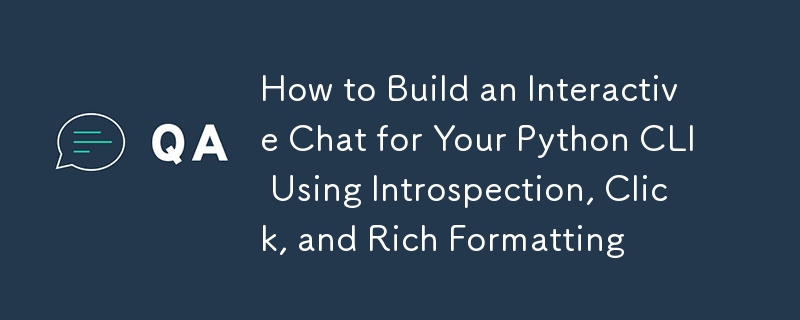

Wenn Sie Ihre CLI schon immer interaktiver und dynamischer gestalten wollten, könnte der Aufbau eines Echtzeit-Befehlsinteraktionssystems die Antwort sein. Durch die Nutzung der Introspektionsfähigkeiten von Python, Click zum Verwalten von Befehlen und Rich zum Formatieren der Ausgabe können Sie eine leistungsstarke, flexible CLI erstellen, die intelligent auf Benutzereingaben reagiert. Anstatt jeden Befehl manuell fest zu codieren, kann Ihre CLI Befehle automatisch erkennen und ausführen, wodurch das Benutzererlebnis reibungsloser und ansprechender wird.
Buntes Konsolen-Chaos: Hier treffen Klickbefehle auf reichhaltige Ausgabe – denn selbst das Terminal zeigt sich gerne mit Stil!
Click vereinfacht die Verwaltung von Befehlen, das Parsen von Argumenten und die Generierung von Hilfe. Es ermöglicht auch eine einfache Befehlsstrukturierung und Optionshandhabung.
Mit Rich können Sie wunderschön formatiertes Markdown direkt im Terminal ausgeben, wodurch die Ergebnisse nicht nur funktional, sondern auch optisch ansprechend sind.
Durch die Kombination dieser beiden Bibliotheken mit Python-Introspektion können Sie eine interaktive Chat-Funktion erstellen, die Befehle dynamisch erkennt und ausführt und gleichzeitig die Ausgabe in einem reichhaltigen, lesbaren Format anzeigt. Sehen Sie sich als praktisches Beispiel an, wie StoryCraftr einen ähnlichen Ansatz verwendet, um KI-gesteuerte Schreibabläufe zu optimieren: https://storycraftr.app.
Der Chat-Befehl initialisiert die Sitzung und ermöglicht Benutzern die Interaktion mit der CLI. Hier erfassen wir Benutzereingaben, die dynamisch den entsprechenden Klickbefehlen zugeordnet werden.
import os
import click
import shlex
from rich.console import Console
from rich.markdown import Markdown
console = Console()
@click.command()
@click.option("--project-path", type=click.Path(), help="Path to the project directory")
def chat(project_path=None):
"""
Start a chat session with the assistant for the given project.
"""
if not project_path:
project_path = os.getcwd()
console.print(
f"Starting chat for [bold]{project_path}[/bold]. Type [bold green]exit()[/bold green] to quit."
)
# Start the interactive session
while True:
user_input = console.input("[bold blue]You:[/bold blue] ")
# Handle exit
if user_input.lower() == "exit()":
console.print("[bold red]Exiting chat...[/bold red]")
break
# Call the function to handle command execution
execute_cli_command(user_input)
Mithilfe der Python-Introspektion entdecken wir dynamisch verfügbare Befehle und führen sie aus. Ein entscheidender Teil hierbei ist, dass Click-Befehle dekorierte Funktionen sind. Um die eigentliche Logik auszuführen, müssen wir die nicht dekorierte Funktion (d. h. den Rückruf) aufrufen.
So können Sie mithilfe der Introspektion Befehle dynamisch ausführen und mit den Dekoratoren von Click umgehen:
import os
import click
import shlex
from rich.console import Console
from rich.markdown import Markdown
console = Console()
@click.command()
@click.option("--project-path", type=click.Path(), help="Path to the project directory")
def chat(project_path=None):
"""
Start a chat session with the assistant for the given project.
"""
if not project_path:
project_path = os.getcwd()
console.print(
f"Starting chat for [bold]{project_path}[/bold]. Type [bold green]exit()[/bold green] to quit."
)
# Start the interactive session
while True:
user_input = console.input("[bold blue]You:[/bold blue] ")
# Handle exit
if user_input.lower() == "exit()":
console.print("[bold red]Exiting chat...[/bold red]")
break
# Call the function to handle command execution
execute_cli_command(user_input)
Betrachten wir einige Beispielbefehle innerhalb eines Projektmoduls, die Benutzer interaktiv über den Chat aufrufen können:
import inspect
import your_project_cmd # Replace with your actual module containing commands
command_modules = {"project": your_project_cmd} # List your command modules here
def execute_cli_command(user_input):
"""
Function to execute CLI commands dynamically based on the available modules,
calling the undecorated function directly.
"""
try:
# Use shlex.split to handle quotes and separate arguments correctly
parts = shlex.split(user_input)
module_name = parts[0]
command_name = parts[1].replace("-", "_") # Replace hyphens with underscores
command_args = parts[2:] # Keep the rest of the arguments as a list
# Check if the module exists in command_modules
if module_name in command_modules:
module = command_modules[module_name]
# Introspection: Get the function by name
if hasattr(module, command_name):
cmd_func = getattr(module, command_name)
# Check if it's a Click command and strip the decorator
if hasattr(cmd_func, "callback"):
# Call the underlying undecorated function
cmd_func = cmd_func.callback
# Check if it's a callable (function)
if callable(cmd_func):
console.print(
f"Executing command from module: [bold]{module_name}[/bold]"
)
# Directly call the function with the argument list
cmd_func(*command_args)
else:
console.print(
f"[bold red]'{command_name}' is not a valid command[/bold red]"
)
else:
console.print(
f"[bold red]Command '{command_name}' not found in {module_name}[/bold red]"
)
else:
console.print(f"[bold red]Module {module_name} not found[/bold red]")
except Exception as e:
console.print(f"[bold red]Error executing command: {str(e)}[/bold red]")
So führen Sie das interaktive Chat-System aus:
@click.group()
def project():
"""Project management CLI."""
pass
@project.command()
def init():
"""Initialize a new project."""
console.print("[bold green]Project initialized![/bold green]")
@project.command()
@click.argument("name")
def create(name):
"""Create a new component in the project."""
console.print(f"[bold cyan]Component {name} created.[/bold cyan]")
@project.command()
def status():
"""Check the project status."""
console.print("[bold yellow]All systems operational.[/bold yellow]")
Sobald die Sitzung beginnt, können Benutzer Befehle eingeben wie:
python your_cli.py chat --project-path /path/to/project
Die Ausgabe wird mit Rich Markdown gut formatiert angezeigt:
You: project init You: project create "Homepage"
Durch die Kombination von Click for Command Management, Rich for Markdown-Formatierung und Python-Introspektion können wir ein leistungsstarkes und interaktives Chat-System für CLIs erstellen. Mit diesem Ansatz können Sie Befehle dynamisch erkennen und ausführen und gleichzeitig die Ausgabe in einem eleganten, lesbaren Format präsentieren.
Wichtige Highlights:
Das obige ist der detaillierte Inhalt vonSo erstellen Sie mithilfe von Introspection, Click und Rich Formatting einen interaktiven Chat für Ihre Python-CLI. Für weitere Informationen folgen Sie bitte anderen verwandten Artikeln auf der PHP chinesischen Website!




